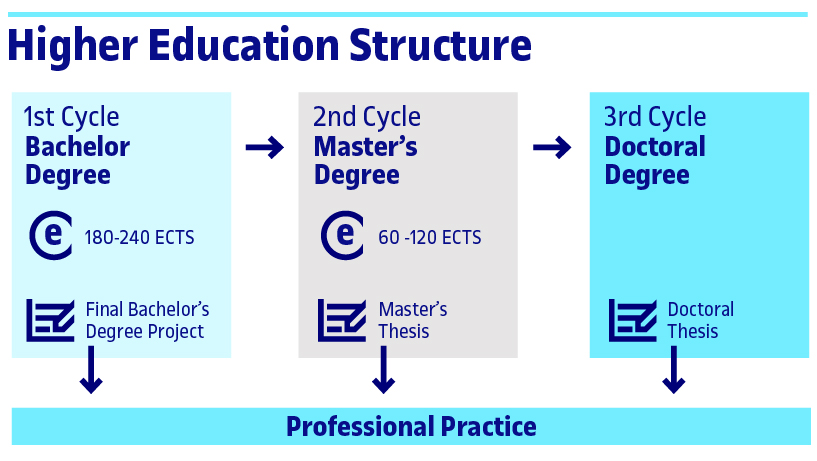The structure of university courses has been defined by the Spanish State as having three cycles: bachelor's degree, university master's degree and doctoral degree, as shown in the following figure
Bachelor's Degree
They provide students with a university qualification and general training in one or more disciplines designed to prepare them for a professional career. To achieve this, they need to have passed between 180 and 240 ECTS credits.
All bachelor's degrees are linked to one of the following branches of knowledge.
- Arts and Humanities
- Sciences
- Health Sciences
- Law and Social Sciences
- Engineering and Architecture
For 240-credit bachelor's degrees, the programme of study contains a minimum of 60 basic curriculum ECTS credits, of which at least 36 are linked to subjects in the programme's branch of knowledge. All bachelor's degrees also include a final project of between 6 and 30 ECTS credits.
For 180-credit bachelor's degrees, the programme of study contains a minimum of 45 basic curriculum ECTS credits, of which at least 27 are linked to subjects in the programme's branch of knowledge. In this case, the final project represents between 6 to 23 ECTS credits.
When a bachelor's degree includes specializations, they appear on the certificate the student receives. These specializations can represent between 30 and 90 ECTS credits.
| Bachelor's Degrees - 240 ECTS | Bachelor's Degrees - 180 ECTS | |||
|
Basic curriculum |
60 ECTS | 45 ECTS | ||
|
At least 36 ECTS credits related to the programme's branch of knowledge. |
At least 27 ECTS credits related to the programme's branch of knowledge. |
|||
| The other 24 ECTS can be from the same or other branches of knowledge. | The other 18 ECTS can be from the same or other branches of knowledge. | |||
| Compulsory and optional subjects | 180 ECTS | 135 ECTS | ||
|
External internship |
Up to 60 ECTS credits (if there is one) |
Up to 60 ECTS credits (if there is one) |
||
|
Final project |
Between 6 and 30 ECTS credits | Between 6 and 23 ECTS credits | ||
Master's Degree
The aim of master's degree courses is for students to obtain advanced specialist or multidisciplinary training designed for academic or professional specialization, or to lead into research.
To obtain a university master's degree, students need to pass a minimum of 60 credits. However, some master's degree courses may require up to a maximum of 120.
University master's degrees can include specializations. If this is the case, they appear on the certificate the student receives. They represent at least 9 ECTS credits for a 60-credit master's degree and at most 45 ECTS credits for a 120-credit master's degree.
| Master's Degree (60-120 ECTS) | ||||
| Master's Degree - 60 ECTS | Master's Degree - 90 ECTS | Master's Degree - 120 ECTS | ||
| Compulsory subjects | 15 ECTS | 22 ECTS | 30 ECTS | |
| Optional subjects | ||||
| External internship | Up to 60 ECTS credits (if there is one) | |||
|
Final project |
Between 6 and 30 ECTS credits | |||
Doctoral programmes
The aim of doctoral programmes is to give students advanced training in research techniques. These may include courses, seminars or other activities aimed at research training, the aim of which is the production and presentation of original research work in the form of a doctoral thesis.
Pursuant to the provisions of Royal Decree 99/2011, of 28 January 2011, regulating official doctoral studies, the doctoral degree will have a maximum duration of 3 years full-time and 5 years part-time, from admission to the programme to submission of the doctoral thesis.
Successfully completing the programme leads to students being awarded a doctorate, which is the highest academic qualification.

